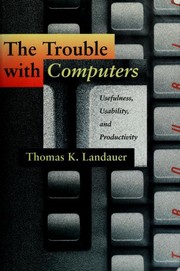Check nearby libraries
Buy this book

Despite enormous investments in computers over the last twenty years, productivity in the very service industries at which they were aimed virtually stagnated everywhere in the world.
If computers are not making businesses, organizations, or countries more productive, then why are we spending so much time and money on them? Cutting through a raft of technical data, Thomas Landauer explains and illustrates why computers are in trouble and why massive outlays for computing since 1973 have not resulted in comparable productivity payoffs. Citing some of his own successful research programs, as well as many others, Landauer offers solutions to the problems he describes.
While acknowledging that mismanagement, organizational barriers, learning curves, and hardware and software incompatibilities can play a part in the productivity paradox, Landauer targets two aspects of computer design as the main culprits: usefulness and usability. He marshals overwhelming evidence that computers rarely improve the efficiency of the information work they are designed for because they are too hard to use and do too little that is sufficiently useful.
Their many features, designed to make them more marketable, merely increase cost and complexity. Landauer proposes that emerging techniques for user-centered development can turn the situation around.
.
Through task analysis, iterative design, trial use, and evaluation, computer systems can be made into powerful tools for the service economy, with the same enormous impact on productivity and standard of living that were the historical results of technological advances in energy use (the steam engine, electric motors), automation in textiles and other manufacture, and in agriculture. Landauer presents solid evidence for this claim, and for a huge benefit-to-cost ratio for user-centered design activities.
He describes how to accomplish these necessary things, promising applications for better computer software designs in business, and the relation of user-centered design to business process reengineering, quality, and management.
Check nearby libraries
Buy this book

Previews available in: English
Showing 3 featured editions. View all 3 editions?
| Edition | Availability |
|---|---|
|
1
The Trouble with Computers: Usefulness, Usability, and Productivity
June 6, 1996, The MIT Press
Paperback
in English
- New Ed edition
0262621088 9780262621083
|
zzzz
Libraries near you:
WorldCat
|
|
2
The trouble with computers: usefulness, usability, and productivity
1995, MIT Press
in English
0262121867 9780262121866
|
aaaa
Libraries near you:
WorldCat
|
|
3
Trouble with Computers: Usefulness, Usability, and Productivity
1995, MIT Press
in English
0585020477 9780585020471
|
zzzz
Libraries near you:
WorldCat
|
Book Details
Edition Notes
Includes bibliographical references (p. [393]-405) and index.
"A Bradford book."
Classifications
The Physical Object
ID Numbers
Community Reviews (0)
Feedback?History
- Created April 1, 2008
- 15 revisions
Wikipedia citation
×CloseCopy and paste this code into your Wikipedia page. Need help?
| July 16, 2024 | Edited by MARC Bot | import existing book |
| January 16, 2023 | Edited by Tom Morris | merge authors |
| January 7, 2023 | Edited by MARC Bot | import existing book |
| September 28, 2021 | Edited by ImportBot | import existing book |
| April 1, 2008 | Created by an anonymous user | Imported from Scriblio MARC record |











